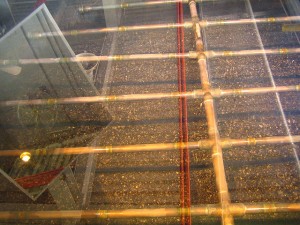Chalk One Up For the Charcoal
In my early twenties as a young bartender, I, like many others, was miseducated that the best-selling American whiskey Jack Daniels was set apart from bourbon because of its label as “Tennessee whiskey,” never really grasping what that supposedly meant. Now as a whiskey educator, the question of what defines the term “Tennessee whiskey” is a sure one in every class. Without a doubt, most Tennessean’s can’t even accurately clear up the confusion. Now the legislators in Tennessee have attempted to help us all out by passing a bill to officially define what is called Tennessee Whiskey in their state.
According to the principal federal regulator the Tax and Trade Bureau of the Treasury Department (TTB), the iconic Tennessee whiskey Jack Daniels could be labeled as straight bourbon. It is technically made according to all the regulations defining straight bourbon. In fact, in treaties where the U.S. has sought protection for the terms 'bourbon' and 'Tennessee whiskey,' it has defined Tennessee whiskey as "straight bourbon whiskey made in Tennessee."
The Code of Federal Regulations does not distinguish a Tennessee Whiskey as a specific category as it does with labels for bourbon, rye, wheat, or corn whiskey. As long as the spirit fit the definition of whiskey and was made in Tennessee, the feds were not too concerned. The two major players in the category, Jack Daniels from Lynchburg and George Dickelfrom Cascade Hollow, never seemed to want to bring much public attention to the fact that they were really straight bourbon made in Tennessee, preferring to focus on the Lincoln County Process distinction of Tennessee whiskey in their savvy marketing.
The Lincoln County Process refers to the filtration of the new make whiskey through maple charcoal before going into barrel for aging. This mellowing technique is often erroneously argued to set the whiskey apart from bourbon, with the ill-informed claiming that the Lincoln County Process adds flavor to the whiskey, thus, throwing it out of the bourbon category since bourbon cannot have any added flavorings according to federal definition. Charcoal filtration is a subtractive process, however, and while it does smooth out flavor, it does not technically “add” flavor.
State law changed in 2009 allowing more distilleries in the state to share in the Tennessee limelight in addition to the two big boys of Jack and George. For the longest time Jack and George were really the only two players. Prichard’s from Kelso was the first to label a whiskey as “Tennessee whiskey” without undergoing the Lincoln County Process. So many new craft distilleries such as Nashville’s Collier and McKeel, Popcorn Sutton, and Corsair, to name a few of the many new labels coming out of Tennessee, apparently have given Jack Daniels a cause for concern. A legislative representative from Lynchburg sponsored a bill that seems to offer some marketing protection of his region’s main business interest.
This new legislation mirrors the federal definition of bourbon except for the requirement that it must be manufactured in Tennessee and filtered through maple charcoal.
Lynchburg must not be the only area with some clout, however. An amendment was included into the bill to exempt Prichard's Distillery from compliance, allowing the distillery to really be the only one legally allowed to use the term Tennessee whiskey without using maple charcoal filtration. All other distilleries reportedly have three years to comply or receive penalty of a minimum one year suspension of their manufacture's license.
The House and Senate agreed on the following code:
An intoxicating liquor may not be advertised, described, labeled, named, sold or referred to for marketing or sales purposes as"Tennessee Whiskey", "Tennessee Whisky", "Tennessee Sour Mash Whiskey" or "Tennessee Sour Mash Whisky" unless the intoxicating liquor is:
(1) Manufactured in Tennessee;
(2) Made of a grain mixture that is at least fifty-one percent (51%) corn;
(3) Distilled to no more than 160 proof or eighty percent (80%) alchol by volume;
(4) Aged in new, charred oak barrels in Tennessee;
(5) Filtered through maple charcoal prior to aging;
(6) Placed in the barrel at no more than 125 proof or sixty-two and one-half percent (62.5%) alcohol by volume; and
(7) Bottled at not less than 80 proof or forty percent (40%) alcohol by volume.
The Tennessee bill is expected to be signed by the governor and take affect next month. Consumers will probably remain nonplussed for a while.



